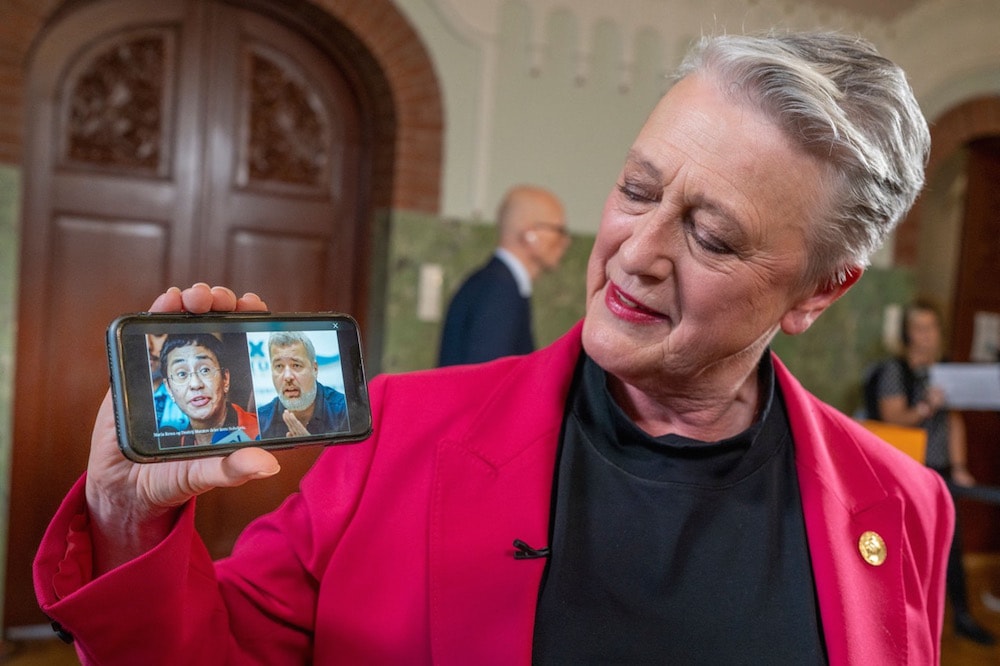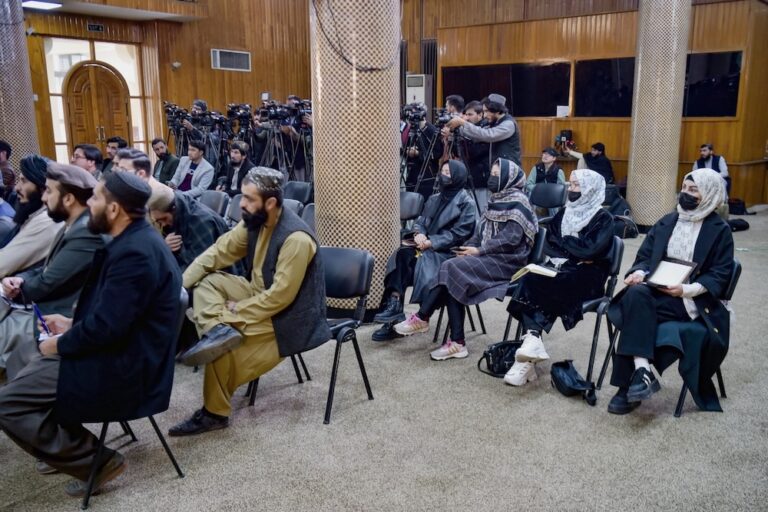October 2021 in Asia-Pacific: A free expression round up produced by IFEX's regional editor Mong Palatino, based on IFEX member reports and news from the region.
Maria Ressa became the first Filipino Nobel laureate for her work as a journalist and truth crusader. Journalists were among the prisoners released in Myanmar, but 20 are still in detention. Several laws that could undermine freedom of expression were passed in October including the Foreign Interference (Countermeasures) Bill in Singapore.
Nobel Peace Prize and media freedom in the Philippines
No journalists have been awarded the Nobel Peace Prize since 1935. In recognizing the work of journalists Maria Ressa and Dmitry Muratov, the Nobel Commtitee has shone a powerful light on the critical role independent media outlets play in challenging authoritarian governments around the world.
In the case of the Philippines, truth-seekers like Ressa have stood their ground in the face of the relentless state-backed attacks targeting the media during the presidency of Rodrigo Duterte. Reacting to the award, Ressa affirmed the role of journalists in speaking truth to power.
“One of the things I’ve learned in the last five years is that the only way a journalist defends himself or herself is by shining the light. You’ve got to keep doing the story. You have to keep speaking.”
In a statement, IFEX acknowledged the importance of the Nobel Peace Prize for all those working to promote freedom of expression amid the rise of authoritarianism in the world today.
“(It) is a testament to the necessity of press freedom for a functioning democracy, and well-deserved recognition that the work of journalists like Maria Ressa and Dmitry Muratov is more important than ever in protecting all of us against the rise of authoritarianism,” stated IFEX Executive Director Annie Game.
Filipino journalists celebrated the award by vowing to continue defending press freedom.
“Press freedom in the Philippines is resilient and enduring. This resilience was forged over time, from the struggle against colonial rule, the tyranny of authoritarianism and the challenges of democracy. Filipinos have defended press freedom because they know it is their right and that their hard-won democracy cannot thrive without it.”
Catch and release (and, in some cases, catch again)
More than 5,000 prisoners are expected to be released in Myanmar after authorities announced a pardon and the dropping of charges for journalists and anti-coup activists.
The release was timed to coincide with the Thadingyut festival, although many observers believe that the junta was pressured to make this action after being snubbed at the recent summit of the Association of Southeast Asian Nations.
IFEX member Mizzima welcomed the release of 15 journalists, which included the company’s co-founder Daw Thin Thin Aung, while pointing out that the arrests were illegal. It urged authorities to reverse the ban it imposed on Mizzima and other independent media outlets.
“We welcome especially the release of journalists and media persons working with Mizzima, DVB [Democratic Voice of Burma] and other media outlets. We hope their release will be followed by a lifting of the ban on the media houses so journalists are able to report from the ground. We believe that free media is a pre-condition for nation-building.”
As of 26 October, the Assistance Association for Political Prisoners monitored the release of 4,065 prisoners, but only 480 names have been verified. In some cities, newly released opposition members were rearrested by authorities.
At least 20 journalists remain in detention, including American journalist Danny Fenster, editor of the independent magazine Frontier Myanmar. Fenster was arrested four months ago on charges of sedition. On 4 October, he was accused of violating another law, the Unlawful Associations Act, which military leaders have been using to arrest journalists who communicate with opposition forces.
In brief: Repressive new laws and regulations
In Maldives, media groups are opposing the proposed Evidence Bill that would allow courts to compel journalists and news outlets to reveal their anonymous sources. A statement signed by five groups including IFEX member International Federation of Journalists (IFJ) warns that the proposal “carries the risk of generating a wider effect of fear and self-censorship.”
In Pakistan, Media Matters for Democracy said that the amended Rules on the Removal and Blocking of Unlawful Online Content (Procedure, Oversight and Safeguard) or Social Media Rules “continue to imperil citizens’ privacy and freedom of expression, and risk their fundamental civil liberties in online spaces.” The amended version will still empower authorities to compel local ISPs and tech companies to provide user information in a “decrypted, readable and comprehensible format or plain version’, which clearly undermines citizens’ right to privacy.
Despite widespread opposition, the Parliament of Singapore has approved the controversial Foreign Interference (Countermeasures) Bill or FICA. Eleven organizations have signed a statement urging the government to withdraw FICA. They are worried that it will “disproportionately impact” members of civil society, independent journalists, academics, researchers, artists, writers and other individuals who express opinions, share information and often collaborate with non-Singaporeans to advocate on socio-political issues and matters of public interest.
Bangladesh is working on a draft data protection law (DPA) which could actually enhance the government’s access to personal data and strengthen its surveillance capabilities. Critics fear it will become another repressive tool similar to the notorious Digital Security Act of 2018 which has been weaponized to justify the arrest of hundreds of activists, journalists, and members of the opposition.
On 28 October, Hong Kong’s legislature passed a bill amending the Film Censorship Ordinance which would allow authorities to stop the screening or publishing of films deemed contrary to national security. Under the law, the Board of Review is also barred from reconsidering decisions made on national security grounds.
Good news: South Korea’s National Assembly has agreed to shelve a bill amending the Press Arbitration Act after encountering intense opposition from the public, including media freedom watchdogs. The measure criminalizes the publishing of ‘false or manipulated’ statements and allows the courts to issue takedown orders on ‘untrue contents’ without any other requirement. Further, the penalties for violating the law can be five times the damage caused by the illegal content.
Focus on gender
Human rights groups welcome the order of India’s National Medical Commission directing publishers and medical schools to remove “discriminatory and unscientific portrayals” of LGBTQI+ individuals from their textbooks and other learning materials. This relates to the June 2021 Madras High Court ruling instructing institutions to stop promoting “prejudicial and inaccurate portrayals” of sexual and gender minorities.
Pakistan’s Digital Rights Foundation (DRF) has relaunched its Hamara Internet website on 11 October, which is also the International Day of the Girl Child. DRF said the initiative aims to make the internet a safe space that is inclusive of women from all walks of life. Some of the articles published this month tackled the role of women in animation, developing female friendships in the digital age, and women learning to use online platforms.
New and noteworthy
SFLC.in has released a comprehensive review of encryption laws in India. It concludes its report by emphasizing the need to “narrowly define the provisions in the existing surveillance laws and to provide adequate procedural safeguards” by conducting a “robust and transparent stakeholder consultation process.”
The Centre for Law and Democracy, in partnership with IFJ and the Maldives Journalist Association, has launched a new report about the state of media in the Maldives. Titled ‘Maldives: Overview of the Environment for Media’, the paper discusses the lack of independence of media regulatory bodies in the country, the continuing impunity for murders of and attacks on journalists, and recommendations for policy and legislative reforms around media regulation and data protection.



